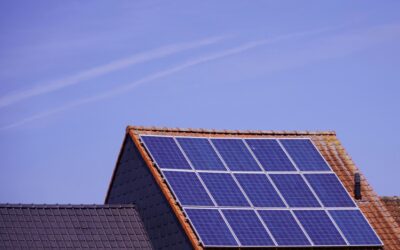Pricing and Tech 101
Home and business owners in South Africa are increasingly seeking out rent-to-own solar installations and the best solar panel prices.
There are multiple reasons to go off the grid: Not only has solar power tech become cheaper and more efficient in recent years; many also want to lessen their reliance on erratic grid-based power supply and go green.
Read this solar panel 101 for comparative solar panel pricing (including Canadian Solar panel prices vs Ja Solar panel prices) and information about the solar technology available.
First: How do solar panel power systems work?
Roof-installed solar panels collect the sun’s (solar) energy, converting this into DC current (electricity). The solar-generated electricity is either stored in batteries or fed straight into a building’s mains via an inverter which converts DC current to AC (alternating current) which most South African appliances use.
The pros of solar energy include:
- Greater reliability than current grid systems (avoiding loadshedding), especially when installed with a battery/backup system
- Financing solar is affordable, with no upfront outlay for equipment, plus your repayments being offset over time by cost savings on monthly utilities
- Greener living: After manufacturing and installation, your solar panel has very little environmental impact (unlike the ongoing ecological impact of solely relying on the grid)
What are the main types of solar panels and associated solar panel prices?
Solar panel prices in South Africa vary depending on which solar panel technology you choose to install.
There are two main kinds of technology:

Monocrystalline Solar Panels
This is our oldest solar panel technology and consists of a single crystal structure (hence the ‘mono’ in the name). Typical JA Solar panel prices for this type of panel range between R1 600+ for a 325 watt panel, and R2 100+ for a 390 watt panel.
Pros of this solar panel type:
Monocrystalline solar panels are:
- Most efficient
- Long lasting – manufacturers tend to give the best warranties for this type
- More compact due to their higher efficiency
Cons of monocrystalline solar panels
Despite high efficiency, this type of solar panel is:
- Slightly more expensive than alternatives
- Marginally affected by temperature increases (when the surface temperature of the panel increases, efficiency decreases, as shown by studies and simulations conducted in the warmer Malaysian climate)
Polycrystalline Solar Panels
Polycrystalline solar panels use newer technology. These panels are more uneven in appearance as their silicon cools unevenly. Typical Canadian Solar panel prices range from R1 840+ for a 335 watt solar panel. This is slightly more expensive than the close equivalent JA Solar monocrystalline panel – 325 watt panels start at R1 690.
Pros of this solar panel type:
Polycrystalline solar panels are:
- More cost effective due to lower production cost
- Suitable for installation in cool areas
- Durable – these panels should last several years
Cons of this solar panel type:
- Polycrystalline solar panels are more heat sensitive than monocrystalline
- They are more delicate and thus prone to damage by falling branches and other objects (so overhead branches should be cut away to minimise change of damage in high winds)
How do I choose between solar panel types?
First, weigh up the pros and cons listed above. Do you want panels that are cost-effective, and you live in a moderate-climate area? Polycrystalline solar panels may be ideal. If you can spare a little extra, monocrystalline solar panels will give you extra durability, plus more efficient operation at a wider range of temperatures.
When you compare JA solar panel prices vs Canadian Solar panel prices, a few hundred rand per panel (if even that much) splits the two. Thus, solar panel prices in South Africa do not differ wildly between reputable, trusted solar manufacturer brands. Renting solar systems to own makes entry even more manageable.
Your best solution is to speak to trusted solar panel experts who can assess your specific solar needs and recommend a solution that balances the best value in solar panel prices with your bespoke needs. Get a no-obligation quote today.
Comparative Table of Prices (Feb 2021)
|
Wattage – Brand – Type – Product |
Approx Price (Inc VAT) |
| 415W – Canadian Solar – Polycrystalline – Super High Power Poly PERC HiKU with T4 |
R2 298 |
| 410W – Canadian Solar – Polycrystalline – Super High Power Poly PERC HiKU |
R2 222 |
|
410W – Canadian Solar – Polycrystalline -Super High Power Poly PERC HiKU with MC4 |
R2 320 |
|
405W – JA Solar – Monocrystalline Solar Panel |
R2 334 |
|
405W – Canadian Solar – Polycrystalline – Super High Power Poly PERC HiKU |
R2 174 |
|
390W – JA Solar – Monocrystalline – Mono Percium LW 5BB Silver Frame |
R2 090 |
| 390W – JA Solar – Monocrystalline – Mono Percium Solar Panel |
R2 134 |
|
365W – Canadian Solar – Polycrystalline – Poly KuMax Half-Cell 35mm Frame with T4 |
R1 950 |
| 335W – Canadian Solar – Polycrystalline – Super High Power Poly PERC HiKU with MC4 |
R1 840 |
| 325W – JA Solar – Monocrystalline – Mono Percium LW Silver Frame with MC4 |
R1 690 |
|
305W – Canadian Solar – Polycrystalline – Poly KuPower Half-Cell |
R1 620 |



